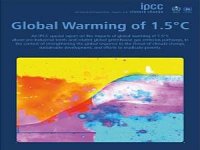© Shutterstock
Was there a need for this report? ‘I think many policymakers may not have understood what they agreed to when, in 2015 in Paris, they agreed to the rise in the global temperature to 1.5 degrees. Now the IPCC has made it clear: A 1.5 degree limit is necessary to protect important ecosystems, it is technically and economically feasible and, properly implemented, it can contribute to sustainable development – but only if we all join forces.’ But hasn’t the message been clear for a long time?‘****Actually, the report contains nothing really new. However, new pressure comes from the fact that what has to be done is now written in black and white. Every state in the world has to agree to the summary, which gives the report enormous political legitimacy. You cannot get out of it now.’

*What do we have to do to keep below 1.5 degrees?* ‘We’ve got to bring net CO2 emissions down to zero. The report makes it amazingly clear that we must do this by 2050. To do this, almost all areas of life have to be turned upside down: how we live, eat, move around, and what we consume. Technical solutions alone will not be enough, we have to change our behaviour. And we have to help developing countries make this rapid transformation.’Isn’t it already too late? ‘The question should be: do we want to limit warming to 1.5 degrees? And anyone who has read the IPCC report will probably say ‘yes’. This is about protecting our habitat and ecosystems and minimizing disasters. So we have to try. One thing is for sure: if we give up the goal and do not even try, we will certainly miss it by a long way. And yes, it is possible and I am positive. The report confirms that there have already been transformations of this speed, but these have been geographically limited, not yet global.

Niklas Höhne, special professor ‘Mitigation of Greenhouse Gasses’
